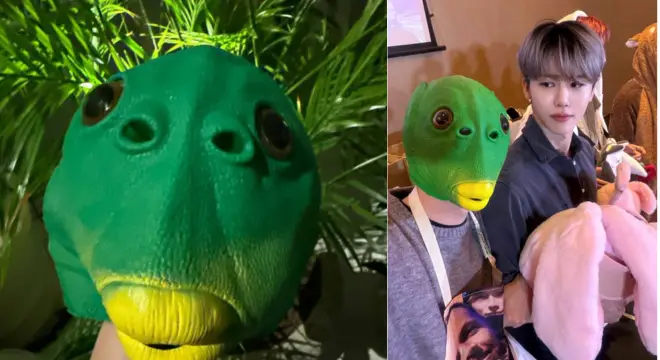|
Getting your Trinity Audio player ready...
|
If there’s one thing K-pop fans have learned by now, it’s that idols can go viral for literally anything — from sneezing cutely on camera to accidentally starting a global debate. This week, two SM Entertainment stars found themselves trending for completely different reasons: NCT’s Chenle, who turned a funny fansign moment into an unexpected “crime scene,” and aespa’s NingNing, who got dragged into a cultural storm over… a lamp.
Let’s break this down – the laughter, the awkwardness, and all of the internet carnage that came after.
Chenle’s Mask Misunderstanding: Where Playful Meets the Internet
Some days ago at NCT’s fansign in Singapore, a fan presented Chenle with a mask- one of those hilarious, kind of creepy masks that become a lightning rod for havoc in an instant.Like any good entertainer, Chenle decided to make the most of it.
He started goofing around with it — scaring Jaemin, joking with fans, and even pretending to sip water through the mask’s mouth. The fans loved every second of it. The moment was pure NCT energy — playful, unserious, and completely chaotic in the best way.
But the internet, as always, found a way to twist the narrative.
A short video clip of Chenle wearing the mask suddenly went viral on X (formerly Twitter), gaining over 2.3 million views. In the clip, Chenle is seen poking his fingers into the mask’s nostrils — and that’s when people online decided he was “digging his nose” in front of fans.
Within hours, memes, comments, and confused reactions flooded social media. Some laughed, some criticized, and others genuinely wondered what was going on.
Chenle Clears It Up — In the Most Chenle Way
Instead of letting the rumor spiral, Chenle did what few idols would — he addressed it head-on with humor and honesty.
On Weverse, he posted a short message for fans (Czennies):
“Hello Czennies, I think there has been a misunderstanding. People said I pretended to dig my nose, but actually my hair is long, so it was covering my eyes. I was going to push my hair to the side, but those were the only holes [in the mask], so it created an unexpected situation.”
Basically: he wasn’t picking his nose — just fixing his hair. The “holes” in the mask made it look hilarious, and his clarification somehow made everything even funnier.
Fans flooded Weverse and Twitter with laughing emojis, praising his honesty and quick response. Some even joked that Chenle managed to turn a misunderstanding into one of NCT’s funniest viral moments of the year.
What’s even more wholesome? Fans started tagging the person who gifted the mask, thanking them for accidentally creating “NCT’s comedy gold.
NingNing’s Lamp Controversy: From Aesthetic Post to Online Backlash
While Chenle’s moment was lighthearted chaos, aespa’s NingNing found herself in the middle of something much heavier — a cultural and historical controversy sparked by an innocent home décor post.
It started when an old photo resurfaced from 2022, where NingNing had shared a picture of a new lamp she bought. The lamp had a unique, cloud-like design that — to some — resembled the mushroom cloud of an atomic explosion.
Fast forward to October 2025, and suddenly the post was trending again on X, gaining over 32 million views. Some Japanese netizens accused NingNing of being “anti-Japanese,” claiming her lamp resembled the atomic bomb explosion — a symbol tied to Japan’s tragic history in World War II.
One user even said, “NingNing has a bad attitude, and I can’t forget that she once sent a mushroom cloud lamp on Bubble.”
The internet, of course, divided instantly.

Fans Step In: Context Matters
While some Japanese fans began “canceling” NingNing, deleting her photos and expressing anger, international fans — especially Koreans and Chinese — quickly came to her defense.
Many pointed out that NingNing is from Harbin, China, a city that suffered terribly during the Japanese occupation. Harbin was home to Unit 731, one of the most infamous sites of human experimentation and wartime atrocities. For people from that region, Japan’s wartime actions are still deeply remembered — and it’s unfair to assume malicious intent from a simple lamp post.
One fan wrote on X:
“I didn’t know this before, but NingNing is from Harbin, which was occupied by Japan for almost 15 years. They killed thousands of citizens in experiments and concentration camps. So…”
Others added that the exact same lamp is sold widely in Japan, even advertised as a children’s nightlight. One user shared a screenshot of a Japanese store listing the lamp as “a cute cloud lamp suitable for kids’ rooms.”
In other words: the lamp wasn’t political at all. It was just a trendy décor item — one that happened to get caught in a storm of over-interpretation.
Internet Reactions: From Outrage to Empathy
As the conversation escalated, it developed a new tone. The conversation saw more people calling out a cultural trend of scrutinizing idols — and women in particular — for benign behavior.
Commenters observed that Western celebrities were often afforded creative freedom, whilst K-pop idols are often expected to represent entire countries in that they have zero freedom for misrepresentation of the countries in which they represent.
In a viral comment, one user succinctly stated it like this:
“So torturing prisoners during the occupation was not deemed an atrocity — yet owning an atom bomb shaped lamp is?”
Yikes – but true.
The NingNing incident illustrated how quickly an online narrative could spiral out of control, especially when nagionalism and history combine to magnify narratives.
Two Stories, One Lesson
Both Chenle and NingNing’s situations show two very different sides of the same coin — how virality in the K-pop world can go from funny to frightening in seconds.
Chenle’s case was a harmless misunderstanding turned into laughter. NingNing’s case, though, was a reminder of how fragile cultural conversations can be — and how online audiences sometimes jump to conclusions without context.
What connects them both is how human their responses and fan reactions were. Chenle laughed it off. NingNing’s fans educated others. Both stories show how K-pop idols today exist under constant digital surveillance — where every gesture, outfit, or object can be misread.
Final Thoughts
Ultimately, the two “incidents” above speak to a larger truth of modern fandoms: social media has made everyone participants in the story. Chenle’s wacky fansign moment and NingNing holding an innocent lamp post know no line if it’s fun or controversy.
Yet among all that, fans are also getting smarter — they are fact-checking and contextualizing, and willing to push back for their idols.
Perhaps this is what keeps K-pop relevant and relatable — not just the performances, but the actual realness, humor, and yes, even confusion that reminds everyone that idols are actual human beings.


